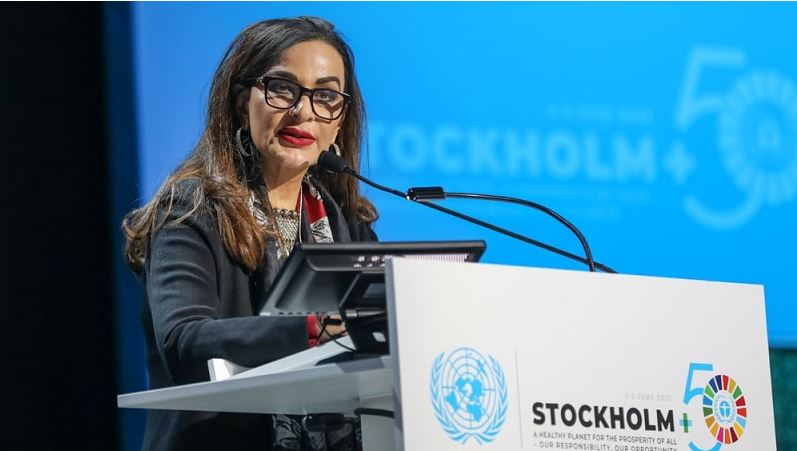Pakistani Journalist Lauds Efforts, Actions of Pakistan’s Climate Ministry at #COP27
Pakistan's Ministry of #ClimateChange played an active and influential role in flood relief campaigns and actions for #ClimateJustice
Pakistan’s Ministry of Climate Change played an active and influential role in flood relief campaigns, and took proactive actions for #ClimateJustice at COP27 summit held in #Egypt, opines a veteran journalist, Humayun Gauhar.

Opinion: With the recent assassination attempt on Imran Khan, all eyes will be on his political progress and the security situation going forward. Whether or not one likes him, it is certain that Imran Khan is one of the greatest achievers in Pakistan and an inspiration to people all over the world.
Losing Imran would be catastrophic for the country. We know he is a risk taker, but let’s hope that he takes stronger safety precautions for himself and for the sake of the country.
While sharp focus remains on political disputes, the waning economy and the upcoming elections, we must not lose sight of the victories Pakistan manages to achieve in the midst of turmoil. The national cricket team played some thrilling cricket in Australia, surprising everybody by qualifying for the T20 World Cup final held a few weeks ago. The next big win came over the weekend (Nov 20) in Sharm el-Sheikh, Egypt. The COP27 climate conference produced a groundbreaking agreement on climate finance for vulnerable countries. The Loss and Damage Fund would not have been possible without Pakistan, led by Minister for Climate Change Sherry Rehman.

In August, unprecedented rainfall left a third of Pakistan underwater. The devastation from the floods caused $30 billion of damage and economic losses. Instead of delivering hackneyed appeals to the international community, Sherry Rehman and her team came up with a thoughtful strategy. From the outset, the Ministry of Climate Change was extremely proactive. It engaged influential power players at the right time. UN Chief Antonio Guterres’s visit to Pakistan was a massive turning point as it highlighted the devastation to the rest of the world. Across the globe, we saw flood relief campaigns and charity drives for Pakistan.
Sherry Rehman wrote a brilliant article for ‘The Guardian’, where she highlighted the damage caused by the floods in Pakistan. She stated some eye-opening facts like Pakistan approximately losing 9.1 per cent of its GDP to the impacts of climate stress. She further added: “The G20 alone accounts for 75 per cent of global emissions, many times more than the club of climate-vulnerable countries, which includes Pakistan, who emit less than one per cent of greenhouse gases but end up paying over the odds in human, social and economic costs for the carbon profligacy of others.”
Sherry Rehman made her case not only for Pakistan but also for other developing countries, arguing that they were also in danger of high climate vulnerabilities and low readiness. Rehman and her team were in constant communication with other countries before the COP27 summit. A concerted effort was made to form a bloc of unity at the conference to strengthen their position. Their preparation and robust arguments came to the fore during the summit.
Pakistan’s climate minister hit the ground running: “We are on the frontline and intend to keep loss and damage and adapting to climate catastrophes at the core of our arguments and negotiations. There will be no moving away from that.” Pakistan did not move away from their narrative. They brought resolve to the negotiations and managed to keep developing countries united on loss and damage. They faced strong opposition from some rich countries that tried to divide them; however Pakistan and its allies were determined. Nabeel Munir, an experienced diplomat and other seasoned negotiators repeated the same message: loss and damage is not charity it’s about climate justice.
Pakistan’s powerful and deft approach won the day. The G77 led by Pakistan stood tall and made sure that the loss and damage fund would start running in 2023. This fund was nothing more than a pipedream at COP26. Asad Rehman, the executive director of the UK charity, War on Want, believes that “without the leadership of Pakistan, we wouldn’t have the outcome.” There was more praise for Pakistan. Harjeet Singh, the global political director at Climate Action Network, says: “Pakistan led from the front. But civil society pressure gave power to negotiators inside the conference rooms to fight harder.”
The fact that the G77 warded off attempts by powerful countries to divide them is a monumental achievement. Pakistan should be extremely proud that they successfully rallied support from all quarters. Sherry Rehman has shown that even in the most challenging circumstances, breakthroughs and milestones can be made. She made sure that responsibilities for loss and damage must be part of the climate finance agenda at COP27. Her efforts over the last few months have given a major push to the climate change narrative. Dialogue and negotiations are now being translated into policy. This is an unprecedented triumph.
Even before the floods, Sherry Rehman took an active interest in climate change projects like ‘The Living Indus’, an FAO initiative. She has given climate change initiatives effective publicity in order to make sure that they become a key part of Pakistan’s national conversation. Even in trying times, there is room to improvise and create milestones through smart and resilient leadership. Sherry Rehman has proven exactly that. Bravo.
The writer is a veteran journalist, political analyst and author. He can be reached at: humayun.gauhar786@gmail.com







